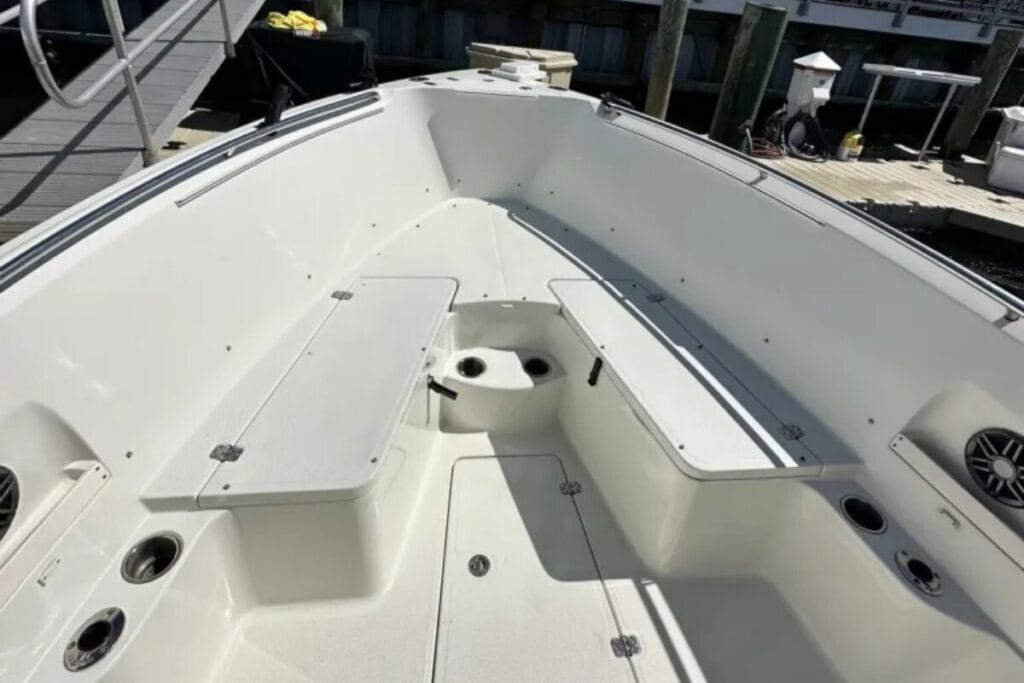Boats are more than vehicles—they’re investments and lifestyle statements. Whether you’re cruising the Chesapeake Bay or towing your vessel to a local lake, keeping it clean and in good condition matters. That’s where boat detailing comes in. At NxtGen Detailing in Oxford, PA, the commitment to thorough, professional detailing ensures your boat is always ready for the water, both aesthetically and functionally. This guide outlines the essentials of boat detailing, what to expect from a professional service, and how it benefits the longevity of your boat.
Why Boat Detailing Is More Than Just Cleaning
At first glance, detailing might seem like a glorified wash, but it goes far beyond that. Boat detailing is a structured process that protects your boat’s materials—fiberglass, gel coat, metal, vinyl, and wood—against environmental stressors like sun exposure, algae, salt, and hard water. Proper detailing includes washing, decontaminating, polishing, waxing, and often deep interior treatment.
Neglecting this routine can result in oxidation, fading, corrosion, and staining. Unlike cars, boats are constantly exposed to a harsher environment. Water minerals, UV rays, and biological buildup like mold or algae can cause gradual but serious damage. Boat detailing isn’t about luxury—it’s about maintenance, protection, and pride of ownership.
Signs Your Boat Needs Professional Detailing
Not every stain or surface mark can be resolved with soap and a hose. Here are telltale signs your boat needs a deeper detail:
- Faded or chalky surfaces: Indicates oxidation or sun damage to the gel coat.
- Water spots or mineral deposits: Especially common around trim and windows.
- Mildew and mold on vinyl or canvas: A sign of deep-seated contamination
- Rust stains or corrosion on metal: Requires specific compounds to remove.
- Persistent grime or fish odor: Can seep into upholstery or carpet over time.
A quick rinse can’t reverse these conditions. That’s where trained hands, the right products, and proper techniques make the difference.
The Core Components of Boat Detailing
1. Exterior Wash and Decontamination
The first step is always a freshwater rinse followed by a boat-safe soap solution that removes surface dirt, algae, and grime. Specialized brushes and soft microfiber mitts are used to avoid scratching the gel coat.
2. Oxidation Removal and Gel Coat Restoration
If your boat’s hull feels rough or looks dull, oxidation has begun. A professional detailer uses compound polishing to remove oxidized layers and restore shine. This is a delicate job—too aggressive and the gel coat thins, too gentle and the oxidation remains.
3. Waxing and Sealant Application
Once polished, a marine-grade wax or synthetic sealant is applied to protect the surface from sun and water damage. This step adds a deep gloss while creating a barrier against UV rays, salt, and minerals. It also makes routine cleaning easier for the owner.
4. Metal and Chrome Polishing
Metal fixtures and rails accumulate rust and water spots over time. A professional-grade polish removes these blemishes and leaves behind a water-resistant coating to delay future corrosion.
5. Interior Detailing
Inside the boat, upholstery, carpet, and compartments are vacuumed, shampooed, and sanitized. Marine vinyl cleaner and protectants are used on seats, while mildew removers tackle any hidden issues in compartments or storage areas.
6. Glass and Canvas Treatment
Windows are treated with streak-free cleaners, and canvas materials are scrubbed and often treated with waterproofing solutions. Zippers, snaps, and enclosures are also inspected for function and longevity.

What to Look for in a Professional Boat Detailing Service
Not all detailing services are created equal, especially when it comes to marine care. A trustworthy boat detailer should bring experience, use marine-safe products, and offer customized packages based on the size and condition of your vessel. Regular car wax or shampoo won’t hold up in a marine environment, so it’s essential they use boat-specific solutions. Clear communication is another sign of professionalism; good providers explain their process, provide realistic timelines, and often offer before-and-after documentation to show their results. Reputation also matters. Whether it’s through online reviews or word-of-mouth in the local boating community, feedback from other boat owners can guide you toward someone reliable.
How Often Should You Detail Your Boat?
There’s no single answer for every vessel, but general guidelines apply:
- Seasonal users (3–4 months of boating): Once at the start and once at the end of the season.
- Frequent users: Every 3–4 months, especially if stored in water.
- Stored outdoors year-round: Quarterly detailing is recommended.
- Stored indoors or trailered: Twice per year is often sufficient.
Frequent washing and touch-ups between professional detailing appointments help preserve the finish and limit buildup of salt, dirt, and mildew.
DIY vs. Professional Detailing: What’s Worth Doing Yourself?
You can—and should—wash your boat regularly. A freshwater rinse after every outing helps prevent buildup. However, deeper detailing requires skill and equipment that most boat owners don’t have. Here’s a breakdown:
| Task | DIY-Friendly | Better Left to Pros |
| Rinsing and light washing | ✅ | |
| Waxing small areas | ✅ (time-consuming) | |
| Oxidation removal | ✅ | |
| Gel coat polishing | ✅ | |
| Interior sanitizing | ✅ | |
| Mold and mildew removal | ✅ | |
| Metal and chrome polishing | ✅ | ✅ for best results |
Improper detailing techniques can actually cause damage—especially on painted surfaces or soft vinyl. Professional services aren’t just faster—they’re safer for your boat.

Common Myths About Boat Detailing
Myth 1: Any wax is fine for boats.
Reality: Marine waxes are designed to withstand saltwater and UV exposure. Automotive waxes lack these properties.
Myth 2: Pressure washing is the best method.
Reality: High-pressure water can strip away protective coatings or damage softer surfaces. Professionals use soft brushes and controlled pressure.
Myth 3: Detailing is only for luxury boats.
Reality: Any boat, from fishing vessels to pontoons, benefits from proper detailing. It extends lifespan, improves resale value, and ensures a more enjoyable experience on the water.
Myth 4: Once-a-year detailing is enough.
Reality: While annual detailing is better than none, routine care throughout the boating season prevents irreversible damage.
The Value in Maintaining Appearance and Performance
Regular boat detailing is an investment in the condition, value, and usability of your watercraft. A clean, waxed hull cuts through water more efficiently, and a tidy deck area makes for a more enjoyable outing with guests. When it’s time to sell, buyers notice when a boat has been cared for—or neglected.
It’s not just about pride; it’s about protection. Marine materials are costly to replace, whether it’s faded vinyl or scratched hatches. By taking a proactive approach to cleaning and detailing, you’re avoiding premature wear and costly repairs.
What to Expect When You Book a Professional Detail
When you contact a detailing provider, they’ll usually start with an assessment of your boat—its size, materials, condition, and usage. Based on this, they’ll recommend a service level: wash only, basic detail, or full restoration. A full job may take several hours or even a full day, depending on condition and weather.
You should expect:
- Honest recommendations (not just upselling)
- Transparent pricing
- High-quality products specific to marine use
- Reliable scheduling
- Post-service care advice
Environmentally Responsible Boat Detailing
Responsible detailers follow eco-friendly practices. This includes using biodegradable soaps, capturing runoff water, and disposing of chemical waste properly. Harbors and marinas are sensitive ecosystems, and detailing shouldn’t come at the cost of environmental impact.
If your boat is detailed on-site or dockside, ask your provider about their environmental standards. Many reputable services now adhere to “clean marina” guidelines for all their work.
Expert Boat Detailing in Oxford, PA: Protect Your Investment with Care That Goes Beyond the Surface
In Oxford, PA, NxtGen Detailing provides expert boat detailing services that tackle the toughest marine challenges—UV exposure, saltwater corrosion, and stubborn mineral buildup. These elements can quickly dull and degrade your boat’s finish, but proper care makes a lasting difference. That’s why every service at NxtGen Detailing goes beyond a simple wash, offering deep, detailed treatment designed to restore appearance, maintain structural integrity, and extend the life of your vessel.
Final Thoughts: Maintaining Your Boat the Right Way
Boats aren’t just weekend toys—they’re memories in motion. Keeping them clean and protected ensures years of worry-free boating. Regular boat detailing isn’t just about aesthetics; it’s about preserving the function and value of your vessel.
For boat owners near Oxford, PA, NxtGen Detailing offers reliable, professional service with a focus on experience and attention to detail. Whether your boat needs a quick seasonal refresh or full gel coat restoration, their team has the skills and tools to handle the job.
Visit nxtgendetail.com or stop by Unit #11 at 501 S 3rd St in Oxford to learn more. Your boat deserves proper care, and so do you.


